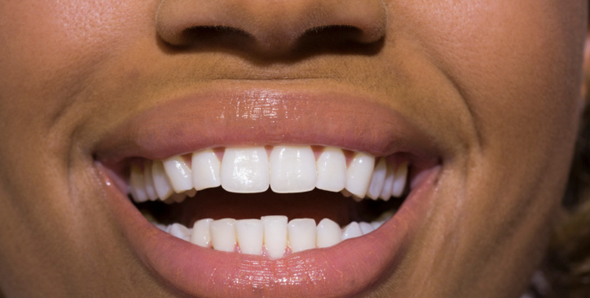As ever when it comes to your teeth, prevention is better than cure. The best way to keep your smile looking bright is to avoid consuming staining substances in the first place. And if you’ve just undergone teeth whitening or are thinking about seeking it in the future, avoiding stains can help you get the most out of your treatment.

Knowing what causes yellow teeth and other types of discolouration is the first step.
1. Drinking coffee, red wine and other teeth-staining beverages
Coffee is a well-known culprit for stained teeth. If you drink it regularly and don’t rinse your mouth with water after drinking it, dark pigments called chromogens in coffee can stick to the enamel surface of teeth, causing them to darken over time.[1]
It’s not just coffee either. Red wine is another likely teeth stainer, which is why sipping water intermittently is recommended to help reduce the staining effect. Black tea is usually high in staining tannins that may lead to more staining than coffee.[1]
Adding milk to tea or coffee can help reduce this effect. Plus, milk is a good source of calcium that’s important for your dental health![2]
2. Eating staining foods
Just like beverages, any food that stains your fingers is likely to stain your teeth too. Foods that could stain teeth include brightly coloured berries, beetroot, sticky lollies and dishes with richly coloured sauces. Think curry sauces, tomato-based sauces and soy sauce.
Light and creamy sauces are less likely to cause teeth stains.
3. Drinking acidic beverages
If you thought white wine was a stain-free alternative to red, think again. The acidity of some wines can soften tooth enamel, making teeth more prone to stains from other food and drink. Carbonated soft drinks and sports drinks can also lead to dental stains – these can have substantial quantities of acid, sugar and pigments. Try to avoid these drinks altogether, or only drink them in moderation.[3]
4. Holding food and drink in your mouth
The longer something is in contact with your teeth, the more time it has to leave stains behind, or for acidic ingredients to act on the enamel. Try not to keep food or drink in your mouth for longer than necessary before swallowing. Consider using a straw for some drinks – this helps limit contact of the front teeth with the liquid.
5. Not drinking enough water
Drinking the recommended quantity of water throughout the day is important for hydration, but it can also help to remove stains by rinsing away staining substances left on the teeth. If you live in a fluoridated area, drinking tap water with fluoride can also help to protect your teeth against decay.[3]
6. Smoking
There are many health reasons to quit smoking already, but tobacco is also a major cause of teeth stains, whether it’s smoked or chewed. Besides stains, smoking is one of the common risk factors for many oral health problems, including gum disease and oral cancer. The sooner you can quit, the sooner your body can start to recover.[4]
7. Not brushing and flossing your teeth
Dental plaque that forms on the surfaces of teeth tends to retain the stains, and good oral hygiene helps reduce the build-up of plaque. Dentists recommend brushing teeth twice a day, preferably using fluoride toothpaste, and using dental floss at least once a day. And, of course, eating a healthy balanced diet without too much sugar can help too.
8. Not visiting the dentist
Regular check-up with your dentist is another important cornerstone of a good oral care routine. Your dentist can check your teeth and gums for early signs of problems and also offer advice about how to help keep your teeth healthy.
If you’re interested in a cosmetic treatment, they can help you understand the possible risks and costs involved so you can make an informed decision that’s right for you. To find out more, talk to your local Bupa dentist.
References
[1] American Dental Association. Whitening: 5 Things to Know About Getting a Brighter Smile [Online] 2015 [Accessed October 2018] Available from: www.mouthhealthy.org
[2] Dental Health Services Victoria. Calcium, vitamin D and phosphorus [Online] 2010 [Accessed October 2018] Available from: www.dhsv.org.au
[3] Australian Dental Association. Sports Drinks [Online] 2016 [Accessed October 2018] Available from: www.ada.org.au
[4] Australian Dental Association. Lifestyle Risks [Online] 2017 [Accessed October 2018] Available from: www.ada.org.au